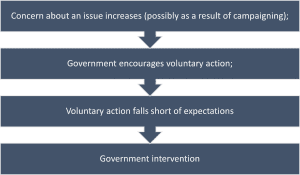The development of a reputation takes time, effort, and resources. It should be central to all engagement and communications, internal and external. But there continue to be examples of the communications outstripping the reality and that brings with it political dangers.
Very often, reputation is considered in relation to its impact on sales. But it is not just about the buying public. The reality is that reputations are fundamental to the whole range of stakeholders for any organisation. So, charities need to worry about their reputations just as much as any business.
Political audiences
Political audiences should be given special consideration because of the power they can exert. Not only can they bring media attention to an issue, but they can pass new laws and regulations that have a fundamental impact on operations, even putting future viability at risk.
It is up to organisations to keep pace with the expectations of their stakeholders. One area where this is becoming ever clearer is the environment and net zero. But if the reality of operations runs ahead of the communications, then the threat of political intervention increases. Rather than improving a reputation, this type of behaviour damages a reputation.
The gap between perception and reality is sometimes called the ‘say do’ gap. It is not just individual companies that end of producing a gap, not always deliberately. Whole industries can suffer from a gap as well. A recent report suggested that those in communications can contribute to the gap as well.
‘Greenwashing’
PR Week recently carried a headline saying ‘PR Under For ‘Greenwashing‘. The story was based on a peer-reviewed report that suggested that the investment of ‘Big Oil’ is clean energy was lagging behind its corporate words. The report went further according to PR Week by suggesting that PR agencies and comms teams are facilitating this ‘greenwashing’.
As with any issue, the less an industry can deal successfully with it, the more likely political intervention becomes. It could be argued that the prospects of intervention are raised even further if the ‘say do’ gap is being manipulated through communications rather than being properly addressed.
In this case, the more that companies cannot be trusted to deal with the environmental, the more politicians are likely to intervene.
Action map
There is a continuum of action:

But individual companies can fall foul of communications issues as well. Such issues can come in a variety of forms. Plastics Rebellion recently complained about an advert by Innocent Drinks. They complained that the animated ad ‘exaggerated the total environmental benefit of the products and was therefore misleading.’ Their complaint was upheld by the ASA. That is not to compare the approach suggested in the report about ‘Big Oil’ and that of Innocent Drinks, but both illustrate that getting the communications right and ensuring that actions match words is critical in maintaining a reputation.
If organisations do not act or over promise and under deliver, then government will step in to take action. No amount of communicating can overcome a failure to deliver against a known problem. If politicians feel that an organisation or industry is hiding behind its communications, then that can sour relations.
Just think about the risks and damage that can be inflicted if politicians are riled.

